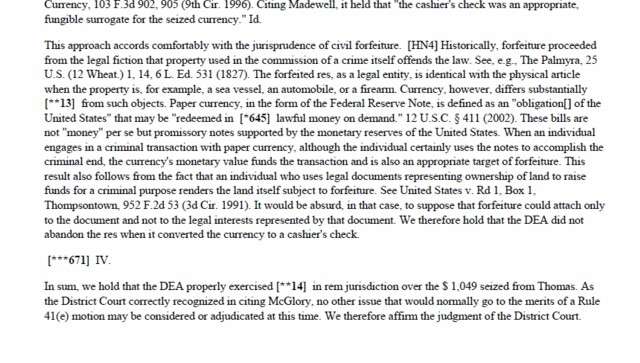wserra wrote:Reply to Dan's analysis of Thomas: with all due respect, I think you put too fine a point on it. The only doctrine that matters is the old in rem principle that, once a seized item is abandoned, it cannot later be forfeited. The only factual/legal question is whether the government's conversion of cash (FRNs) into a cashier's check constitutes "abandonment". You really don't need to analyze the nature of FRNs to answer this question. As the Third Circuit itself said in Thomas, "no legal significance attaches to the bills themselves". To avoid a result that the Third Circuit called "absurd" in an analogous case, it held "that the DEA did not abandon the res when it converted the currency to a cashier's check".
The Third Circuit need have gone no further than that. However, despite having called the FRNs in question "money" no fewer than five times and "cash" or "currency" several more, the Third Circuit digresses with the passage quoted in this thread. Whether the presence of that passage is simply careless, or represents a judge or law clerk attempting to demonstrate historical erudition, is unimportant. Wherever the issue is squarely raised - and it rarely is, because "lawful money" is not a legal term - FRNs are held to be "lawful money". I cited only a sampling of those cases above. The facts of Thomas don't raise the issue.
There really isn't an explanation for sloppiness other than sloppiness. It happens to everyone.
I agree that you are not coercing your own intent out of the opinion as much as I am coercing "lawful money" upon the mention of money in it. We should read the entire paragraph at least:

It is fairly easy to see that you are painting a flourish upon the topic sentence since dissecting it properly required citing and paraphrasing (quoting) Title 12 USC §411 from §16 of the 1913 Fed Act. Therefore I will delude myself into thinking that we agree the Third Circuit was sloppy with Qualoosian State Secrets (FRNs are not money). How dare the justices put you into such a clumsy position as to have to call them "sloppy"!
Thank you for cleaning up all the misnomer flames! I realize that had to take a bit of your time.

